Eiyuden Chronicle: Hundred Heroes review - An old school JRPG in every sense
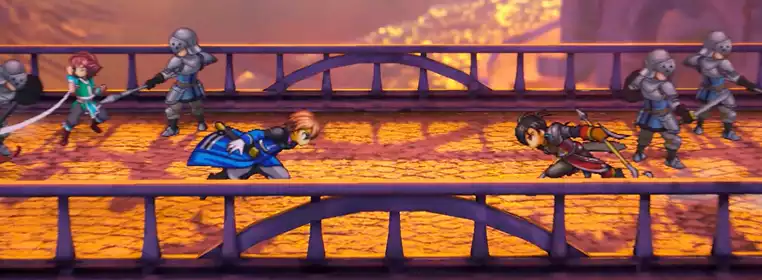
In my preview last month, I detailed both my excitement and reservations after playing Eiyuden Chronicle: Hundred Heroes' opening hours, with its intriguing narrative and obvious Suikoden influence weighed down slightly by some sluggish gameplay choices.
While the bright spots still remain, Hundred Heroes, unfortunately, remains a game of conflict for me - tethered back by design choices that, while I understand their intention, feel frustrating to encounter in their regularity. Regardless of that, there are still shining aspects within almost every part of the game that cement my excitement and reignite the magic that so many of us associate with both modern and classic JRPGs.
GGRecon Verdict
There is no doubt that the vision Rabbit & Bear Studios had behind Eiyuden Chronicle: Hundred Heroes yearns for JRPG classics - with Suikoden at the heart (and history) of many of the team. This has many benefits, with a world fit for a grand adventure, and a combat system beaming with countless intricacies, but with that anachronism comes some roadblocks too.
How well you navigate these frustrations will definitely define your enjoyment of the game, but they far too often strayed into the negative for me, and more often than not hampered my overall experience of the game. You can tell that there's so much love here though, and I'm very glad that there's space for it to be made.
Yes, there's really one hundred
Perhaps one of the clearest links to Suikoden is the sheer number of characters available to bring into your party here, as arguably only a series like Romancing SaGa has got near to the scale set by the iconic series.
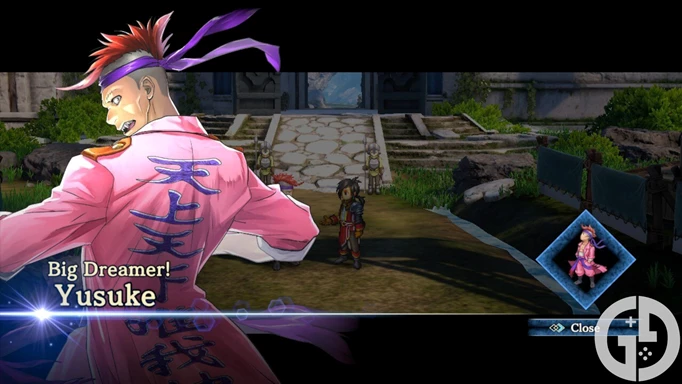
 Click to enlarge
Click to enlargeAs the title suggests, there are one hundred (and a few more) heroes for you to recruit on your travels - each with their own unique design, characterisation, and combat mechanics. Of course, you have a mere fraction of these at the beginning of your journey, but a big part of the exploration effort is bringing as many into the fold to ensure that your army is as strong as it possibly can be.
You'll find people from all walks of life too, as warriors mix with nobles, so-called Guardians who aim to protect the world's sacred Runebarrows, and even some mystical treefolk too. It is always exciting to spot a new character out in the world, and many are optional, off the beaten path, or require you to fulfil a specific quest before they join you.
My biggest frustration with gaining the vast number of characters on offer here is how difficult it is to balance between them and ensure that they're all viable for your party. This isn't a knock on the act of crafting your ideal party - which I'll get on to shortly - but instead a slight on the lack of a shared XP mechanic - leaving it easy to just never use so many of the characters at your disposal.
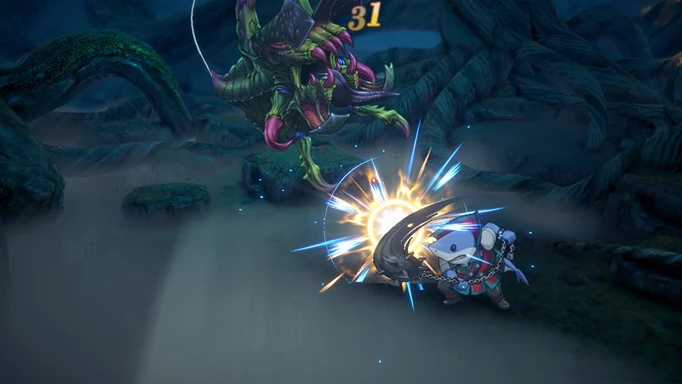
 Click to enlarge
Click to enlargeIn the early game especially there were characters that were joining me at level 10 when my main party was beyond 20, and it would have been really nice for them to level up passively in the background - even at a reduced rate - so that I could ease them into my party eventually. Instead, I either had to throw them into battles way higher than they should and risk dying with no XP gain, or just simply leave them out - and regrettably, I often opted for the latter.
Between the lines
Placing these characters into battle is where Eiyuden Chronicle: Hundred Heroes takes flight though, as there are countless different combinations that you can craft to form the ideal turn-based battle team.
Three frontline and backline spots make up your six-character party, and each position plays a key role in your success. Characters are designated a combat length between short, medium, and long, and this determines how far their attacks will be able to stretch into the enemy's own formation. Short characters typically deal the most damage and have the highest defence, but are functionally useless in your own backline so must be shoved up front. Long heroes, on the flip side, are much weaker and can be felled with ease - but are capable of manipulating the battlefield from the safety of the backline.
Despite my reservations about how tricky it was to keep everyone at the same level, I did very much enjoy the constant tinkering of party members and battle positions, and finding a strategy that worked, even just for a short while, was so satisfying.
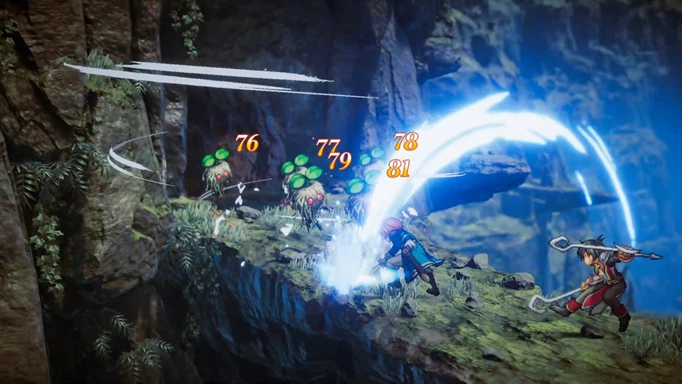
 Click to enlarge
Click to enlargeThis is emphasised by the nature of the game's clear turn order, which shows you exactly when each character will act - and can change with certain actions. Having one party member with high speed set up the actions of another later on feels strategic, and this is further enhanced by the numerous hero combinations which create powerful attacks or spells if you have two aligned characters in your current party.
I praised it specifically in my preview too but I really love the addition of an 'auto' mode when it comes to battles, allowing your characters to enact specific pre-set instructions while you watch on. Not only did this help speed things up in some instances, but it also added another layer of strategy and complexity to the battles, where tweaking your overall approach and individual instructions could create a balance between powerful attacks and resource management.
It was a little frustrating that there doesn't seem to be a way to save these character-specific instructions when switching between heroes though, as it did get a little tedious having to constantly go back into the preset menu to reapply everything once a new party was formed.
Hundred Encounters
I don't hate random encounters - under the right circumstances, I quite like them actually! They can force you to manage your resources and act as a good way to ensure that you're rarely under-levelled or behind the difficulty curve.
These two aspects are true in practice in Hundred Heroes, but rapidly derail into the realms of irritation and resentment that plagued much of my experience with the game.
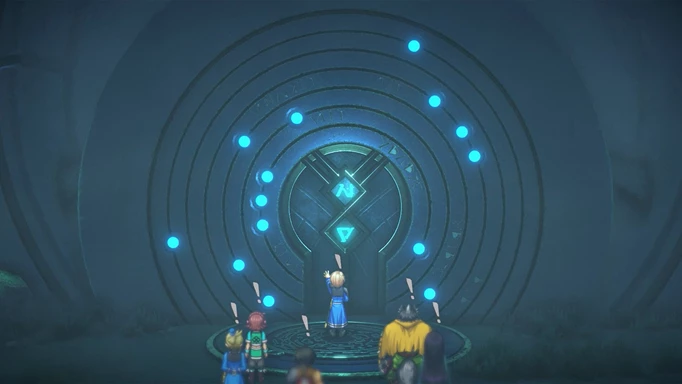
 Click to enlarge
Click to enlargeThere was a dungeon about 15 hours into my playthrough that largely acted as one big environmental puzzle. In theory, this was an engaging area that tasked me with figuring out the different routes and understanding the ever-changing map, but in practice, it became a period of play that I could not wait to end.
It felt like every ten seconds or ten steps my character took a new group of enemies would pop up out of thin air, interrupting my progress and draining my resources further. I felt like I had no space for experimentation or exploration as I knew that doing anything more than necessary would just lead me to another bunch of battles that I was tired of fighting.
This unfortunately extends to the open world too, making backtracking feel like a chore. There is the option to allow enemies to flee if they're a certain number of levels underneath your current party - but this takes time to play out and becomes very repetitive to do over and over again. You don't even get anything if you do choose to play the battle out, with nominal XP gains and no way to prevent these battles from appearing in the first place.
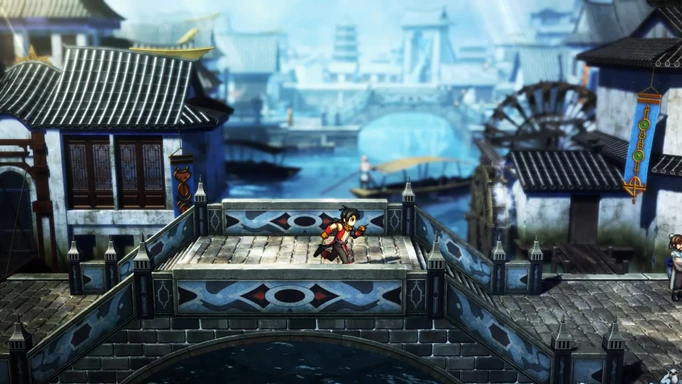
 Click to enlarge
Click to enlargeAnother side to my frustrations here is the generally cumbersome speed at which most things seem to move. I don't bemoan a game for not including any form of turbo or sped-up option as it shouldn't feel like a necessity, but it feels like a missing element here because the rhythms of the game don't feel up to pace.
All of the battle animations are both charming and impressive at first, but seeing Nowa's same multi-hit attack take several seconds in every single battle did get a little bit fatiguing after a while!
Paired with this is the relatively long loading times in most situations too, which were consistent across both Steam Deck - where I spent most of my playtime - and PC. Instances like random encounters become that bit more irritable in their repetition when it takes a few seconds to load in and out every time, and they end up feeling more like interruptions than anything I actually want to be doing when playing.
Full steam ahead
Thankfully, while these experiences were frustrating, I could play Eiyuden Chronicle: Hundred Heroes from the comfort of functionally anywhere as the game plays wonderfully on Steam Deck.
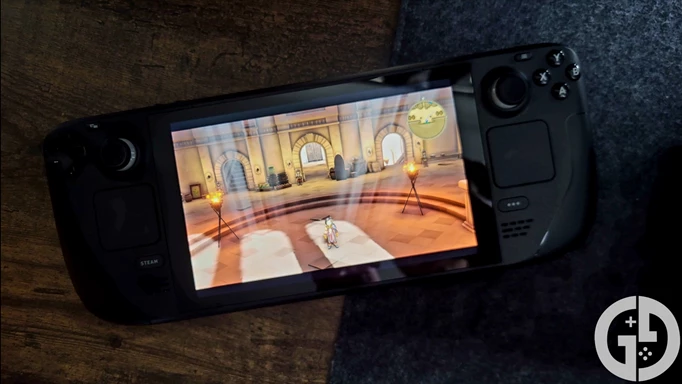
 Click to enlarge
Click to enlargeI did opt to half the hardware refresh rate to 30Hz and lowered the TDP slightly in order to extend the battery life, which was typically around four hours on a full charge, but you could easily run it with all bells and whistles without too much of a hassle.
The 2D art style looks beautiful on the smaller screen too, and I experienced almost no functional issues outside of a few mirrored borders during cutscenes, which were simply resolved with a restart. If you've got a Steam Deck and are interested in playing Hundred Heroes, then I'd definitely recommend taking the plunge as it feels like the ideal place to play.
The Verdict
There is - or at least, I want there to be - a great game here, with combat that structurally emulates what made Suikoden so memorable and recognisable and a world filled with countless varied characters. It just feels like much of what the game is trying to achieve is held back by frustrating design choices that feel stuck in the past, and your enjoyment largely will be defined by your tolerance for such elements.
You'll have plenty to enjoy if you can get past these elements though, and it serves as a wonderful spiritual resurrection of a series that will likely never have a new instalment, and an emulation of so many things we love from classic JRPGs - even if a few aggravating anachronisms have also persisted along the way.
3.5/5
Reviewed on Steam Deck & PC. Review code provided by the publisher.
